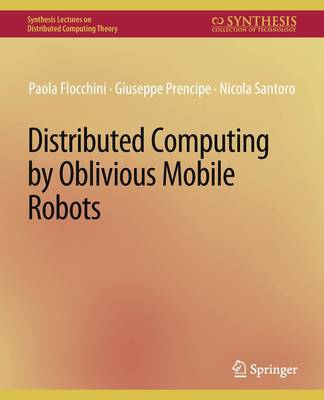
- Retrait gratuit dans votre magasin Club
- 7.000.000 titres dans notre catalogue
- Payer en toute sécurité
- Toujours un magasin près de chez vous
- Retrait gratuit dans votre magasin Club
- 7.000.0000 titres dans notre catalogue
- Payer en toute sécurité
- Toujours un magasin près de chez vous
42,45 €
+ 84 points
Format
Description
The study of what can be computed by a team of autonomous mobile robots, originally started in robotics and AI, has become increasingly popular in theoretical computer science (especially in distributed computing), where it is now an integral part of the investigations on computability by mobile entities. The robots are identical computational entities located and able to move in a spatial universe; they operate without explicit communication and are usually unable to remember the past; they are extremely simple, with limited resources, and individually quite weak. However, collectively the robots are capable of performing complex tasks, and form a system with desirable fault-tolerant and self-stabilizing properties. The research has been concerned with the computational aspects of such systems. In particular, the focus has been on the minimal capabilities that the robots should have in order to solve a problem. This book focuses on the recent algorithmic results in the field of distributed computing by oblivious mobile robots (unable to remember the past). After introducing the computational model with its nuances, we focus on basic coordination problems: pattern formation, gathering, scattering, leader election, as well as on dynamic tasks such as flocking. For each of these problems, we provide a snapshot of the state of the art, reviewing the existing algorithmic results. In doing so, we outline solution techniques, and we analyze the impact of the different assumptions on the robots' computability power. Table of Contents: Introduction / Computational Models / Gathering and Convergence / Pattern Formation / Scatterings and Coverings / Flocking / Other Directions
Spécifications
Parties prenantes
- Auteur(s) :
- Editeur:
Contenu
- Nombre de pages :
- 171
- Langue:
- Anglais
- Collection :
Caractéristiques
- EAN:
- 9783031008801
- Date de parution :
- 28-08-12
- Format:
- Livre broché
- Format numérique:
- Trade paperback (VS)
- Dimensions :
- 190 mm x 235 mm
- Poids :
- 331 g

Les avis
Nous publions uniquement les avis qui respectent les conditions requises. Consultez nos conditions pour les avis.






